Afghanistan War, Civil Liberties, Habeas Corpus, Human Rights, Surveillance, Targeting Muslims, Torture, Truth to Power
Podcast: Play in new window | Download

No End In Sight, Number One In War
What will you remember on Memorial Day? US law officially proclaims Memorial Day “as a day of prayer for permanent peace.” – However, the US is much closer to permanent war than permanent peace – writes Bill Quigley, legal director of the Center for Constitutional Rights in his recent article titled No End In Sight, Number One In War. The article outlines, the rising costs of war, the damage to country and who reaping massive profits. At what point do we begin to transition to permanent peace?
Bill Quigley:
- Yes, politicians are making hay from the permanent war, but there’s also a lot of people who are making an awful lot of money from the US military.
- We discount the role they’re playing, in keeping the US constantly fearful and preparing for and perpetrating war in every place across the globe.
- This is something that people are afraid to talk about.
- The “Axis of Evil” spends less than one percent of what the US spends. This coming year the US will spend 708 billion dollars on war and another $125 billion for Veterans Affairs.
- Al-Qaeda spends less than one percent of one percent of what the US spends.
- You have to ask yourself “why?” Why are people in the United States more afraid than anybody in the whole world? Fanning the flames of fear. Behind the scenes are huge corporations that are making billions of dollars.
- We talk about Blackwater, but there are a couple corporations that dwarf Blackwater.
- Lockheed Martin, a huge corporation that runs almost entirely on tax payer money. 140 thousand employees.
- A corporation totally reliant on the United States Congress. You spend 125 thousand lobbying Congress and Congress doesn’t get some benefit from that.
- The US is spending 10 times more on the military than China. Who is calling for accountability on this spending?
Guest – Bill Quigley. Bill is the Legal Director for the Center for Constitutional Rights, a national legal and educational organization dedicated to advancing and defending the rights guaranteed by the United States Constitution and the Universal Declaration of Human Rights. Bill joined CCR on sabbatical from his position as law professor and Director of the Law Clinic and the Gillis Long Poverty Law Center at Loyola University New Orleans. He has been an active public interest lawyer since 1977.
—
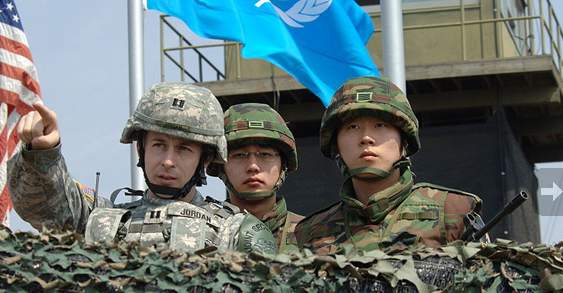

End The Korean War
Hosts get an update on the uneasy tensions between North and South Korea. A multinational investigation concluded last week that a North Korean submarine had torpedoed the 1200 ton warship called the Cheonan back in March killing 45 people. North Korea denies involvement in the sinking, South Korean defense ministry denies that any of its ships had crossed “Northern Limit Line.” Meanwhile, the threat of sanctions against the already oppressed North Korean population escalate. South Korea and the Obama administration have agreed to initiate joint anti-submarine military exercises near North Korean border. Right now, there are almost 29,000 U.S. troops in South Korea.
Eric Sirotkin:
- When you look into the history of the conflict, and we are still technically at war, as an armistice doesn’t technically end a war only stops the shooting.
- These kind of incidences occur because you don’t have a peace regimen to fall back on.
- There is a very conservative South Korean government. Very hawkish toward the North
- The intitial report of them torpedoing the boat, there are a lot of questions, there are people who are writing about Tonkin Bay, and thinking about.
- You have a choice to march toward war or go toward peace.
- The United States at this point is ramping up the rhetoric.
- Before this situation with the South and the North, we had a lot more exchanges and things were going in a positive direction. If you think there’s no exit strategy after Iraq, look at Korea, sixty years later.
- We’re working with a campaign to end the Korean War.
Guest – Attorney Eric Sirotkin, is a member of the National Lawyers Guild and helped found Korean Peace Project. Eric Sirotkin, the founder and Director of Ubuntuworks, LLC mixes his experience as a human rights lawyer, film producer, author and peacemaker. Over the years his peacemaking activities have taken him around the world, including India, Peru, Cuba, South Africa, Japan, North and South Korea, France, Netherlands, Canada and China. He contributed to dialogue on the new Constitution in South Africa, was a UN sponsored election observer at President Mandela’s election and coordinated an international monitoring Project of the South African Truth and Reconciliation Commission.
——

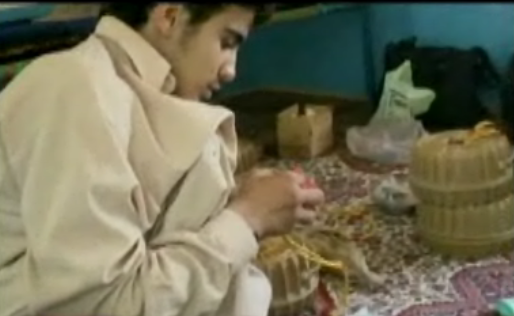
Omar Khadr, First Military Commission Trial Under Obama
Last week the first military tribunal opened under the Obama administration. It is the case of Omar Khadr, the Canadian citizen, military prosecutors say that Omar Kadr threw a grenade that killed a US Special Forces medic in Afghanistan and helped build roadside bombs to use against American soldiers. We look at why the Obama Administration is putting a detainee on trial who was 15 when he was captured and whether the self – incriminating statements he has made can be used as evidence. Unless the Prime Minister acts to request repatriation, Khadr could face conviction by a jury of U.S. military officers based on evidence extracted by torture.
Attorney Jonathan Hafetz:
- International law is very clear on how you treat child soldiers. In 2001, military commissions were struck down by the Supreme Court, in 2006 in the Hamdan Case, Congress created them again.
- The hope was that Obama was going to close this chapter and end military commissions.
- Obama suspended military commissions for 4 months and brought it back.
- You have huge issues in Khadr’s case. He was a child soldier. He was accused of killing an American soldier in a fire fight. Number one, the US doesn’t seem to have any credible evidence not derived from torture or other abuse that Khadr actually killed the serviceman.
- Even if they had evidence that Khadr was responsible for the death of this serviceman, it’s not a war crime. It’s part of war but not a war crime. The US government’s theory of war is totally distorted.
- On the day of the first war crimes trial of a juvenile in US history, the day its starts and new rules are handed out, I don’t think they had enough copies to give to all the council.
Guest – Jonathan Hafetz, attorney with the ACLU’s National Security Project.
——————————————————
Afghanistan War, Civil Liberties, Human Rights, Truth to Power
Podcast: Play in new window | Download
Updates:
——–
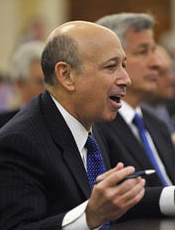
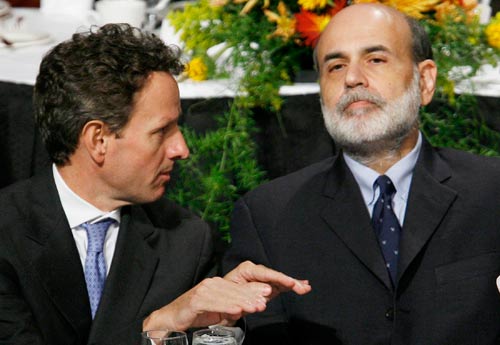
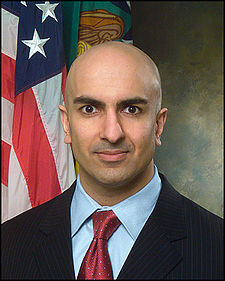
Jobless Recovery and the Federal Reserve Holdout
Today we welcome back Rick Wolff, Professor of Economics at the University of Massachusetts and his son Max Wolff freelance researcher, strategist, and writer in the areas of international finance and macroeconomics to discuss the current economic recovery, is it recovering without job growth? Rick is also the author of the book, Capitalism Hits the Fan: The Global Economic Meltdown and What to Do About It, where he takes the reader back to 2005 and step by step reveals how policies, economic structures and wage-to-profit systems led to a global economic collapse.
We get a critical update from both Rich and Max. Will there be another leg down as predicted. Another leg down meaning, will the economy continue to drop? This was mentioned because of the way people were investing, investing in a way that expected the market to drop.
Rick Wolff / Max Wolff :
- There’s a recovery in some parts and not others. The missing piece of the economic puzzle is job growth.
- Housing assets are 35 percent off their 2006 peaks. 15.5 million people unemployed. 1 out of 6 in the labor force in a dire economic situation. Misery index, looks at long term unemployed – 27 weeks or more.
- 41 percent of our unemployed have been out of work for 27 weeks.
- Average unemployment benefits cap out at 2000.00 a month
- “Phony ‘Economic Recovery’, Real Alternatives” – article by Rick Wolff
- You have to wonder that we live in a time of massive unemployment, the recovery didn’t deal with that problem, and yet we don’t have a national discussion of “direct employment.” We did need a banking bailout, we chose to bail out some elements of society and not others.
- A couple of hundred billion dollars for say kids to continue to got to school on the subway, or community colleges can stay open, or job training programs, or the state of California can stay open, we decided was a waste of money?
- The average person in the US has a 30 day life expectancy without International finance.
- 61 thousand UAW workers laid off.
- US Cash for Clunkers program, borrowed European model but replaced old used cars with new SUVs, and increased price of used car parts.
- Oregon Example: Last summer, the state legislature controlled completely by the Democratic party passed a bill to face their 700 hundred million dollar shortfall, not by cutting social programs, but by taxing the corporations and the rich. Unions, liberal folks, and the democratic party (left of where it is in the rest of the country)
- We need 110 – 120 thousand new jobs a month to keep up with population growth. Jobless growth recovery from 2002 to 2007 was from explosive consumer debt.
- People buying more things without getting jobs (credit) The last 18 months we witnessed the largest re-distribution of wealth in US history. The bottom 80 percent stood still and the top 20 percent lead by the top 5 percent shot up.
- 7.8 million homes in the foreclosure pipeline
Guest – Richard D. Wolff is Professor of Economics Emeritus, University of Massachusetts, Amherst where he taught economics from 1973 to 2008. He is currently a Visiting Professor in the Graduate Program in International Affairs of the New School University, New York City. He also teaches classes regularly at the Brecht Forum in Manhattan.
Guest – Max Fraad Wolff , freelance researcher, strategist, and writer in the areas of international finance and macroeconomics. Max’s work can be seen at the Huffington Post, The AsiaTimes, Prudent Bear, SeekingAlpha and many other outlets.
———-
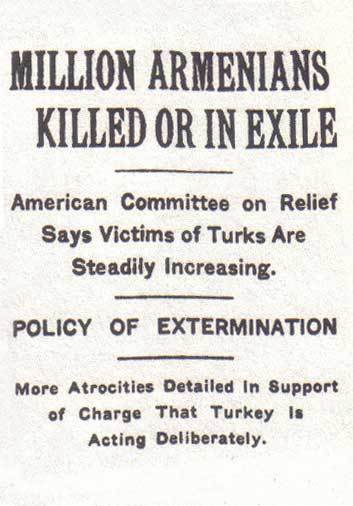
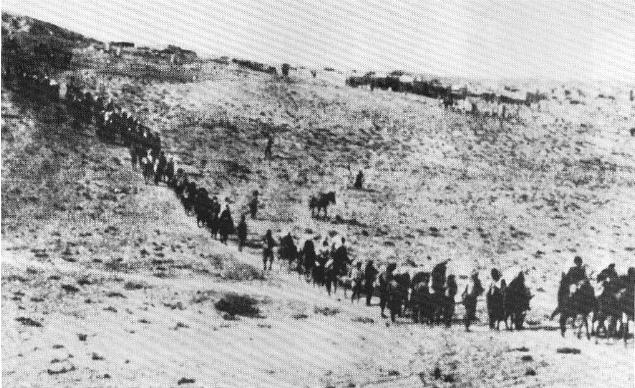
Radio Documentary – It Was Genocide: Armenian Survivor Stories
April 24, 2010 marks the beginning of the systematic implementation of a plan to exterminate the Armenian race 95 years ago. Carried out by the Young Turk government of the Ottoman Empire, over half of the Armenians living in the Empire were killed. To commemorate this, the first genocide of the 20th century, Law and Disorder co-host Heidi Boghosian and producer Geoff Brady present a 90-minute program titled, It Was Genocide: Armenian Survivor Stories.
We wish to thank WBAI for their commitment to recognizing the Armenian genocide, and are grateful to the individuals we interviewed for opening their hearts and sharing the difficult memories of the past.
————————————————–
Afghanistan War, Civil Liberties, Human Rights, Iraq War, Targeting Muslims, Torture, Truth to Power, Uncategorized
Podcast: Play in new window | Download
Updates:
—–

Israeli Policy and Palestinian Children – Nora Barrows-Friedman
We talk today with the Nora Barrows-Friedman, she is the host of radio show Flashpoints at KPFA in Berkeley California. Nora spent the last month in the occupied West Bank and East Jerusalem. She’s been investigating stories about the ongoing violations of Palestinian human rights and has been frequently traveling to Palestine since 2004. Today we look specifically at the Israeli policy against children from arresting, detaining, interrogating, torturing, imprisoning and beating children, some as young as 10. Nora says International laws designed to protect children — including the UN convention on the rights of the child are being circumvented and violated on a daily.
Nora Barrows Friedman:
- Kids randomly picked off the street, allegedly for throwing stones. The Israeli punishment is 10 years in prison for a child.
- Israeli military can arrest (Palestinian only) children as young as 12. Right now there are 300 Palestinian children in Israeli prisons.
- Hebron is a city where settlers have been given half of the old city, a settlement colony is inside the Palestinian community
- These two young children were followed and taken into a military center inside the settlement colony.
- This whole family had been destoryed by these illegal actions against these 2 brothers. The only recourse this family has is to take it to the Israeli military court. Motive: trying to get Palestinian families to leave.
- This family lives in an area where settlers have their eye on, seems to be very deliberate.
- There are hundreds of women in Israeli prisons, there’s a story where a woman gave birth in the prison, and the baby is now a prisoner.
Guest – Nora Barrows Friedman: Senior producer and co-host of KPFA’s Flashpoints.
————-
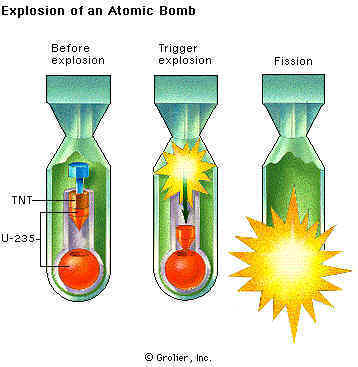

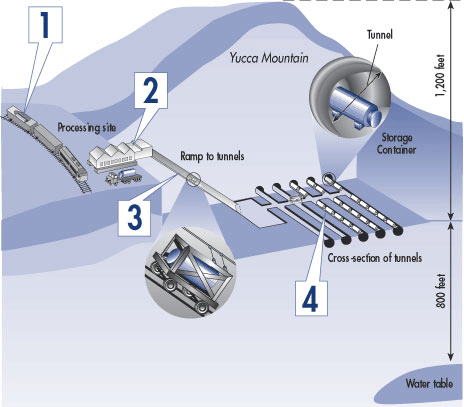
Obama’s Plan for Elimination of Nation-Controlled Nuclear Power
Nine nations now have a combined total of more than 22 thousand nuclear weapons. The United States has about 5 thousand nuclear weapons, 500 of them are land based warheads which can fly in three to four minutes after the order is given. President Obama recently hosted a nuclear security summit in DC with more than 45 foreign leaders, he traveled to Prague and signed a treaty that would cut the combined US and Russian stockpile by a third. Meanwhile, the US nuclear stockpiles have been shrinking for the last 40 years. We talk more about the current nuclear disarmament effort with attorney Peter Weiss is Vice-President, former President, of the International Association of Lawyers Against Nuclear Arms.
Peter Weiss:
- Leave the doomsday clock where it is. Reaffirming of the status quo. The agreement with Russia in reducing the nuclear weapons allowed to each country from 2200 to 1500. They count all the warheads on a bomber plane as one, instead of 10 or 12 weapons.
- Jimmy Carter: A single nuclear armed submarine had enough weaponry to destroy every Russian city of 100 thousand or more.
- Nuclear Posture Review – Zero document / “It’s difficult to operationalize a vision.”
- Obviously there is a great danger of loose nukes. No one seems ready to adopt an anti-nuclear convention except the countries that don’t have nuclear weapons.
- Conference in Riverside Church on May 1, 2010, United For Peace and Justice
- The anti-nuke movment will be re-energized.
- The US wants to be the sole repository of weapons grade nuclear material, committment from Chile, and Canada, to ship WGNM to the US. That’s kind of weird isn’t it?
Guest – Peter Weiss, former Vice President, Center for Constitutional Rights and Vice President, of the International Association of Lawyers Against Nuclear Arms.
——
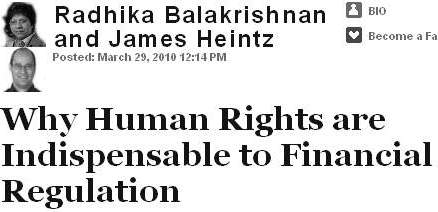

Why Human Rights are Indispensable to Financial Regulation
Today we speak with Radhika Balakrishnan, Professor of Economics and International Studies at Marymount Manhattan College, about her recent article in the Huffington Post titled Why Human Rights are Indispensable to Financial Regulation. Balakrishnan enumerates the global human fallout from the world financial crisis. The World Bank estimates an additional 400 thousand children will die before their fifth birthday, while those responsible for the turmoil are benefiting from bailouts and promotions. She references the Universal Declaration of Human Rights and its inclusion of economic and social rights, that is the right to work, to education, to rest, to an adequate standard of living. Dr. Balakrishnan has also outlined steps for meaningful reform that we will also examine today. She is currently working on a project trying to use human rights norms to evaluate and construct macroeconomic policy.
Radhika Barakrishnan:
- We pretend there is no criteria regulating (economic policies) We argue in our piece, that human rights have a way to set up an ethical basis and framework. Most people don’t know that human rights include economic and social rights.
- In the United States the assumption is you can vote the people in to give you social and economic rights.
- The idea that the market is this Greek Oracle that we can’t question. . . is a problem.
- We’re saying there is a form of biased market regulation, where the state has the interest of the financiers and the banks.
- and not those of the working people and the working class. One example is the minimum wage.
- The Federal Reserve has a dual mandate, one is to have price stability, the other is the right to work.
- In the United States, we have not signed the Convenant on Economic and Human Rights.
- The Federal Reserve is a government agency and the fact that they act in a cloak of secrecy is a real problem.
- I think there is a great case to be brought, as far as freedom of information.
- What kind of financial models are they using to make their decisions? This cloak of secrecy because you independence to make monetary policy? But independence doesn’t mean secret.
- Their Board of Governors are from the commercial banks, whose interest will they work for?
- Bailout Bill – TARP / This went to financial agencies to give them the money. 720 Billion dollars overnighted to the Federal Reserve has not gone out? The Stimulus Money, for employment creation, though it was used for tax cuts.
- Congress did not extend unemployment benefits for Spring recess.
- The United States is coming up for the Universal Periodic Review in the Human Rights Council of Geneva
- The Center for Women’s Global Leadership
Guest – Radhika Balakrishnan, Executive Director of the Center for Women’s Global Leadership and Professor in Women’s and Gender Studies. She has a Ph.D. in Economics from Rutgers University. Previously, she was Professor of Economics and International Studies at Marymount Manhattan College. She has worked at the Ford Foundation as a program officer in the Asia Regional Program. She is currently the Chair of the Board of the US Human Rights Network and on the Board of the Center for Constitutional Rights. She has published in the field of gender and development.
——————————————————————————
Afghanistan War, Civil Liberties, Gaza, Human Rights, Iraq War, Prison Industry, Targeting Muslims, Truth to Power
Podcast: Play in new window | Download
Updates:
—————-
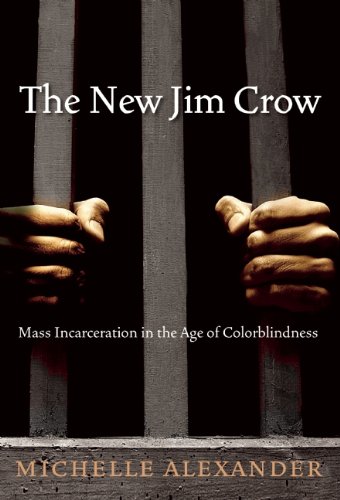
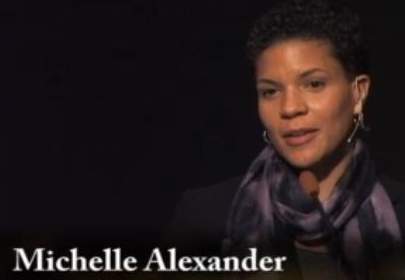
The New Jim Crow: Mass Incarceration in the Age of Colorblindness – Michelle Alexander
Michelle Alexander, author of the new book The New Jim Crow: Mass Incarceration in the Age of Colorblindness joins hosts. Michelle book has been called an incisive critique of racial caste system in America. As many celebrate the “triumph over race” with the election Barack Obama, the majority of young black men in the US are locked behind bars or permenantly labeled felons. Michelle Alexander, a former litigator who is a legal scholar, argues that the civil rights community—and all of us— are challenged to place mass incarceration at the forefront of a new movement for racial justice in America.
Michelle Alexander:
- I began in my own research to question the prevailing political media narrative about the reasons of people of color and ghetto communities cycle through the criminal justice system today, it is not as it appears.
- I argue that in a few decades after the collapse of Jim Crow, we as a nation, have managed to re-create as a racial caste in America, in some major American cities, the majority of African American men, are locked behind bars, labeled felons for life.
- Legally discriminated in employment, housing, access to education, and public benefits. We have not ended racial caste, we redesigned it.
- The Drug War was declared in relation to racial politics, not drug crime. About 30 million were arrested for drug offenses after the launch of the drug war. Most were for marijuana possession, now considered less harmful than alcohol or tobacco.
- Drug markets like American society generally are segregated by race and class
- The Supreme Court has made it virtually impossible for these cases to be brought.
- Baldus Study: McKleskey v Kemp
- Finding proof of conscious intentional discrimination is nearly impossible. Severe racial disparities are of no consequence, immunized not just the death penalty.
- I wrote this book, largely because I was deeply troubled by the failure of civil rights organizations and black leadership in this country to place mass incarceration and the war on drugs at the top of our racial justice agenda.
- Ten of millions of people in the United States are now regulated permanently to an under-caste, who are barred by law from seeking jobs or housing, public benefits, food stamps.
- Prisons have been holding many rural towns together as jobs have disappeared. The majority of people put behind bars are non-violent offenders. Every race suffers from this drug war, there are white people doing decades in prison for drug possession charges. The suffering of the drug crosses the color lines, and we got to be able to galvanize a level of public awareness and support.
- Something akin to a racial caste system is alive and well in the United States.
Guest – Professor Michelle Alexander, joined the OSU faculty in 2005. She holds a joint appointment with the Moritz College of Law and the Kirwan Institute for the Study of Race and Ethnicity. Prior to joining the OSU faculty, she was a member of the Stanford Law School faculty, where she served as Director of the Civil Rights Clinic.
Professor Alexander has significant experience in the field of civil rights advocacy and litigation. She has litigated civil rights cases in private practice as well as engaged in innovative litigation and advocacy efforts in the non-profit sector. For several years, Professor Alexander served as the Director of the Racial Justice Project for the ACLU of Northern California.
———
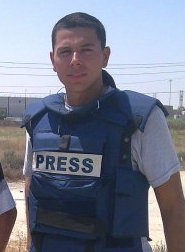
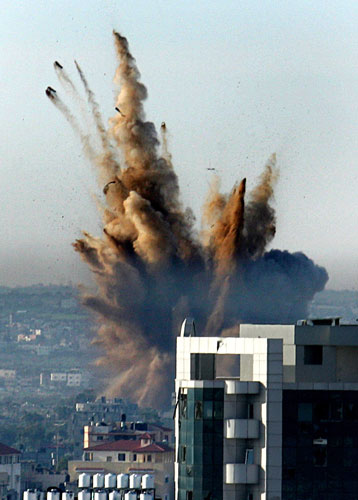

Ayman Mohyeldin, Al-Jazeera TV correspondent
Ayman joins hosts in the studio. He is an Al Jazeera TV correspondent and former CNN producer based in Baghdad. He was the only news producer allowed to observe and report on the US handover of Saddam Hussein to an Iraqi judge. Ayman has been stationed in the Gaza Strip since May 2008, where he has covered the Gaza siege. Ayman talks with hosts about his experience covering the destruction during Operation Cast Lead. Filmmakers and producers are working on a documentary film about Ayman’s war reporting in Palestine. Facebook link
Ayman Mohyeldin:
- Saturday December 27th, 2008, I had been based in Gaza. It had been quiet in Gaza up to November 4th.
- We started hearing the first wave of Israeli air-strikes that destroyed government buildings, police station within minutes. It kicked of a series of air strikes throughout the day. 200 hundred Palestinians were killed that day.
- We really saw everything, I can’t begin to describe the horrors of what we saw. On the first day we went to the main Gaza hospital.
- People of Gaza were trapped in a territory subjected to a very modern sophisticated, well trained and equipped Army.
- By Israel’s own admission rocket fire into Israel had dropped 98 percent 4 months ago (before Operation CastLead)
- What were the real reasons for the attack, the war was unnecessary given what was achieved in the 4 months prior.
- The siege on Gaza has allowed Hamas to tighten it’s grip on Gaza. The siege has not punished Hamas.
- Palestinians have recycled the rubber and steel from the destruction.
- I was standing on a rooftop and they were dropping hundreds of leaflets from planes, that read “your area is going to be attacked, if have any information about Hamas, please call this number.”
- Goldstone Report: Israel while bombing did not distinguish between military and civilian targets. Not a mistake.
- Targets include – Mosques, schools, ambulance drivers, government buildings, ministries, Palestinian Legislative Council Building.
- Gaza, historically was not an affluent place, it was a merchant trade route from Africa into Asia and Europe.
- Stunted growth is starting to appear among Palestinian children.
- Gaza: Desperate, frustrated, a sense of abandonment by the international community.
Guest- Ayman Mohyeldin, Arab American journalist based in the Middle East and is the Gaza Correspondent for the English language channel Al-Jazeera. Previously a producer with CNN and NBC, Ayman was one of the first western journalists allowed to enter and report on the handing over and trial of the deposed President of Iraq Saddam Hussein by the Iraqi Interim Government for crimes against humanity
———————-
Afghanistan War, Civil Liberties, FBI Intrusion, Habeas Corpus, Human Rights, Prison Industry, Surveillance, Targeting Muslims, Torture
Podcast: Play in new window | Download
Updates:
—–
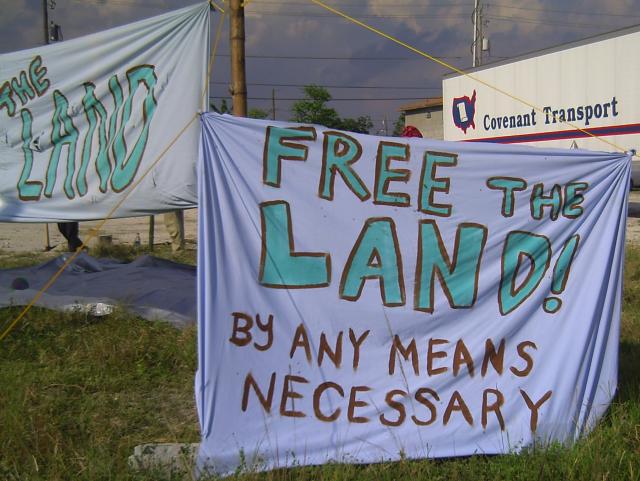
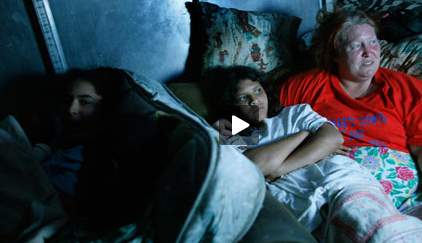
Take Back The Land and The Center For Constitutional Rights Delegation To South Africa
The national movement, Take Back the Land has demanded housing for the homeless in Miami, New York City and is in South Africa to engage in anti-eviction and land reform work. Lawyers with the Center for Constitutional Rights will also join Take Back the Land and provide legal support to the social justice movements. The two groups will be in Cape Town with the Anti-Eviction Campaign and 3 days in Durban with Abahlali bs Mjondolo or (ABM). Among the core beliefs of this project called the Center for Pan African Development are, land is an essential element of liberation, the black community must collectively control land in the black community and the path to liberation is pave through self-determination, not the accommodation of those in power.
Sunita Patel:
- The history of Apartheid is so connected to land and redistribution of land. We spent a few days in Cape Town with the Anti-Eviction Campaign. We traveled to Durban and visited with ABM there. Throughout the trip activists and community members had shared stories of displacement and mass evictions at the government’s hands, without any redress. We have a lot to learn from the movement in South Africa.
- In the United States, we can’t think beyond the private ownership of land.
- Housing is not a constitutionally protected right. Where we can gain from international human rights law, we need to infuse that into our work. The Universal Declaration of Human Rights, recognizes housing as a human right.
- South African Constitution states in articles 26 and 33 affording one house for one family.
Guest – CCR staff attorney, Sunita Patel is involved with racial profiling, immigrant rights and other human rights litigation. Prior to her position at CCR, she held a Soros Justice Fellowship at The Legal Aid Society, Immigration Law Unit in New York where she represented immigrant detainees in removal proceedings and worked with criminal justice and human rights groups to create independent community oversight for detention operations through public accountability boards.
————–
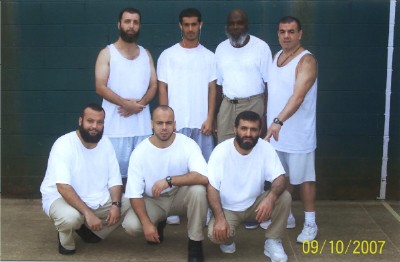

CCR Challenges Experimental Prison Units that Restrict Communication
The Center for Constitutional Rights filed a lawsuit challenging violations of fundamental constitutional rights, including the right to due process, at two experimental federal prison units called “Communications Management Units” (CMUs). The units are being used overwhelmingly to hold Muslim prisoners and prisoners with unpopular political beliefs.
CCR filed Aref v. Holder in the D.C. District Court on behalf of five current and former prisoners of the units in Terre Haute, IN and Marion, IL; two other plaintiffs are the spouses of prisoners. The CMUs were secretly opened under the Bush administration in 2006 and 2007 respectively and were designed to monitor and control the communications of certain prisoners and to isolate them from other prisoners and the outside world. More about Aref
Rachel Meeropol:
- It’s the first time we’ve seen units like this in the federal system. The Bureau of Prisons secretly created these prisons in 2006 and 2007 under the Bush Administration.
- The bureau of prisons initially offered a public comment period and were flooded with comments of what a bad idea this is. They withdrew the public comment and continued to build the prison in secret.
- There’s no meaningful process at all as to who should be put in this unit.
- The Bureau of Prisons has published very broad criteria about the types of individuals, it thinks belongs there.
- The criteria is so broad it could encompass tens of thousands of prisoners.
- When we look at who is being sent the unit, it’s mostly Middle Eastern Muslims, African Americans who have converted to Islam in prison, and also a lot of people with unpopular political views.
- One of our clients Daniel McGowan, is an environmental activist who is serving a term in prison. He never violated a prison rule, he was a low security prison for the first part of his sentence, and then without any reason, he is moved to this highly restricted unit.
- The CMU is an experiment in social isolation. Very few opportunities for visits. Uniquely cruel for individuals who have to undergo it.
- Bad public policy, these individuals are going to be released at some point.
- We are seeking to challenge the extreme limitations on their phone calls and visits.
- Most inmates get 300 minutes a month of phone calls, my clients for years had only one 15 minute call a week.
- For prisoners with large families, this is incredibly difficult. It seems to me this is truly about silencing advocacy from inside the prison.
- Some of our clients including Mr Aref were convicted on terrorism related charges, in his case material support.
- When prisons move prisoners into the CMU of extremely restricted confinement without any process or explanation, of course leads to putting prisoners in the CMU for discriminatory or retaliatory reasons.
Guest – Rachel Meeropol has worked at the Center for Constitutional Rights (CCR) since 2002. She is the co-editor and primary author of the Jailhouse Lawyers Handbook, a widely-requested resource for prisoners, and the editor of America’s Disappeared: Secret Imprisonment, Detainees, and the “War on Terror,” (Seven Stories Press, 2005).
—————–
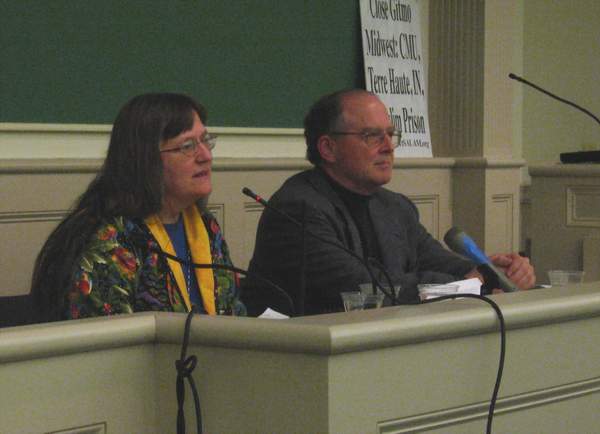
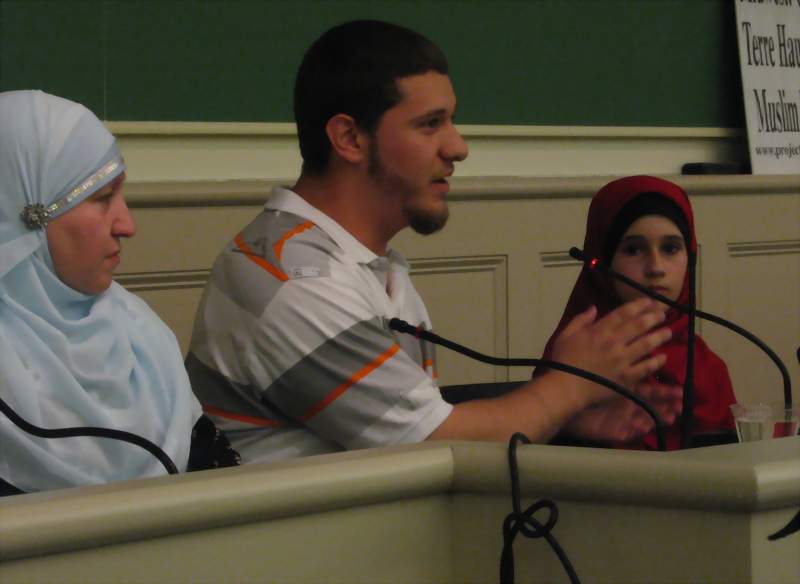
FBI Entrapment: Personal Stories of Preemptive Prosecution
We go now to hear segments from the event titled FBI Entrapment: Personal Stories of Preemptive Prosecution sponsored by the National Lawyers Guild, Middle Eastern Law Students Association (MELSA), Islamic Law Students Association (ILSA) and Law Students for Human Rights.
Families and community members gathered in a room at NYU to discuss their cases, and how their family members were entrapped by FBI informants and agent provocateur tactics. As we have reported in the past years, the FBI have used these tactics to target Muslims and others by offering money and assets within impoverished communities. Some FBI groups target mosques and incite violent action. Most informants are felons, that have made plea-deals with the FBI. As we have seen, these stories make headlines across the country on Memorial Day or the 4th of July, meanwhile, these men implicated in the FBI stings are serving long sentences. We get an inside perspective from their families. We hear from Lynne Jackson and Attorney Stephen Downs from Project Salam. We also hear from 12 year old Lejla Duka, and her cousin, family members with the Fort Dix Five case.
Lynne Jackson / Attorney Stephen Downs
- CCR filed Aref v. Holder in the D.C. District Court
- Aref/Hossain have left behind 2 families, 10 children, ranging in ages 4-16 years old.
- What is going on with our country?
- We formed Project Salam, we need to look at all these case together, there are hundreds of cases.
- We’ve had no response at all from President Obama or Attorney General Holder
- The Cheney one percent doctrine. If there is one percent chance that a Muslim will commit a terrorist act down the road you have to take them out.
- One of the worst things you can do as Muslim is be generous. The government made good use of the material support for terrorism statute.
- Certainly from my point of view, as a lawyer I assume every conversation I have is being monitored. I think all of you should to.
- Check out prisoner database at CMU’s (PDF)
Lynne Jackson, volunteer and co-founder of Project Salam, Attorney Stephen Downs, a retired New York State attorney and a volunteer attorney for the Yassin Aref case. Listen to last year’s Law and Disorder interview.
————————————————————————–
Afghanistan War, Civil Liberties, Gaza, Human Rights, Iraq Veterans, Iraq War, Targeting Muslims, Torture, Truth to Power
Podcast: Play in new window | Download
Updates:
—
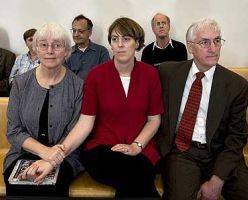
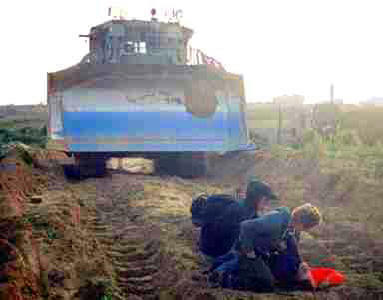
Rachel Corrie wrongful death v Israel
This month, the Haifa District Court in Israel will begin hearing eyewitness testimonies in a civil lawsuit filed in 2005 by Rachel Corrie’s family against the State of Israel for her unlawful killing in Rafah, Gaza. On March 16, 2003, Rachel was crushed to death by a Caterpillar D9R bulldozer while trying to protect the home of a Palestinian doctor from demolition. She was run over and killed by an IDF soldier who was operating the bulldozer. Seven years later, Rachel’s parents are still seeking the truth. The trial is expected to show the circumstances of her death and hold the Israeli military reponsible. Four eyewitnesses to Rachel’s killing have been recently granted visas by Israel to testify but Israel is refusing to allow the Palestinian doctor who treated Rachel and confirmed her death into Israel.
Maria LaHood:
- CCR represented Rachel Corrie in the United States because she was run over by a Caterpillar bulldozer. The same month in 2005, the Corries brought a suit against Israel, in Israel for the killing.
- This suit was on the advice of the US State Department. You can sue Israel, the country. Israel claims immunity.
- Israel’s defense that the bulldozer driver couldn’t see Rachel Corrie in the bright orange jacket.
- Expert witness says Israel’s heavy machinery operator policy says do not use around people.
- Rachel was defending the home and the bulldozer crushed her. Rachel was with the International Solidarity Movement. The Corrie family will present their evidence to the Israeli court and then there’s a 30 day break in the trial. This is not a jury trial, it is before a judge. Corries are asking for information, and accountability.
- In the attacks of Gaza a year ago, more than 4000 houses were demolished.
- Someone was filming at the border at the time of Rachel’s death, the actual part of the tape where she was crushed is missing.
- Mamilla Cemetery Case Update: We’ve asked the special rapporteurs of the United Nations to intervene.
- Michael Ratner: It does seem to be intentionally provocative. To be doing this on a cemetery and calling it the “Center for Tolerance” MamillaCampaign website.
Guest – Staff attorney Maria LaHood. Maria specializes in international human rights litigation, seeking to hold government officials and corporations accountable for torture, extrajudicial killings, and war crimes abroad. Her cases include Arar v. Ashcroft, against U.S. officials for sending Canadian citizen Maher Arar to Syria where he was tortured and detained for a year; Matar v. Dichter, against an Israeli official responsible for a “targeted assassination” that killed 15 Palestinians; Belhas v. Ya’alon, against a former Israeli official responsible for the 1996 shelling of a United Nations compound in Qana, Lebanon, that killed over 100 civilians; Corrie v. Caterpillar, on behalf of Palestinians killed and injured in home demolitions, and Rachel Corrie, a U.S. human rights defender who was killed trying to protect a home from being demolished.
———–
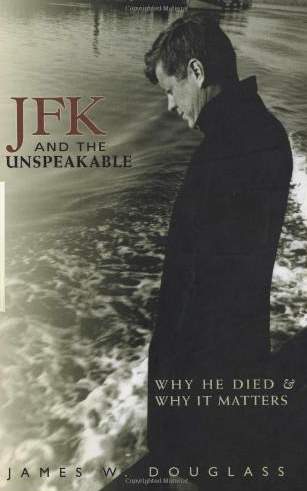
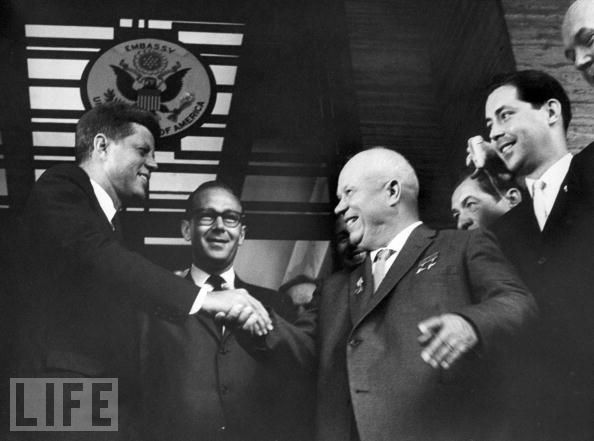
JFK and the Unspeakable: Why He Died and Why It Matters by Jim Douglass
JFK, The Unspeakable, is the first book of 3 on the assassinations of the 1960s. Orbis Books has commissioned author James W. Douglass to write about the murders of JFK, Malcolm X and Martin Luther King, and his the third will be on the assassination of Bobby Kennedy. The heart of JFK the Unthinkable, is not how Kennedy was killed or how Kennedy became a threat to the systemic war machine, but why DID Kennedy die? Author James Douglass says Kennedy knew that he would die and had the guts to stand up to the system and take the hit. This narrative was lost for decades, obscured by disinformation about Kennedy’s character and the conspiracy of his assassination. One review summarizes Douglass’s book in this way : JFK’s belated effort to turn America from an armed culture of victory to a member of an international peaceful world was shot down in Texas for a reason.
Jim Douglass:
- John F. Kennedy’s experience in WWII: He was in the South Pacific, he volunteered. He was on that PT boat.
- What happened on that PT boat, is that it got split into two by a Japanese destroyer. He lost brothers and friends at that time. An extraordinary experience being adrift on the ocean warning other PT boats. The experience create a distrust in military authority.
- He said that he wanted to splinter the CIA into a thousand pieces and scatter to the winds.
- As Kennedy said to his friends, “they figured me all wrong.”
- The Unspeakable: the kind of evil and deceit that seems to go beyond the capacity of words to describe. The midst of war and nuclear arms race, the assassinations of Kennedy, Martin Luther King and Malcom X that the term was used.
- JFK’s vision is articulated in the address June 10, 1963, arising from the turnaround of the missile crisis and Bay of Pigs.
- He wanted to move step by step into a disarmed world. Nikita Khrushchev put that speech all over the Soviet Union. The Cuban Missile Crisis is a deeply misunderstood part of our history, because it’s usually portrayed as Kennedy going to war with Nikita Khrushchev and beating him.
- The truth was that Kennedy and Nikita Khrushchev were in over their heads, the US generals wanted nuclear war, because they had more warheads than the Soviets.
- Nikita Khrushchev: We now have a common enemy from those pushing us toward war.
- At that point the Cold War turned upside down because Kennedy and Khruschev became closer to each other than either was toward their own military power system.
- Vietnam: Kennedy’s military people would not give him an exit policy. He signed the withdrawal order from Vietnam before he was assassinated.
- His friends said that he had an obsession with death. It was not an obsession but a real assessment that he was going to die. If you try to turn around a national security state that is dominating the world,
- and you do so as president of the United States, of course you’re going to die. Kennedy knew that.
- The book is a story on the deliberate destruction of hope, the vision of change, a turning of this country all of which was happening and had to be stopped. US Agencies killed Dr. Martin Luther King – 1999 Verdict
- We’re in the same scene right now with Petraeus and McChrystal setting up Obama. They were dictating terms to Obama, unlike Kennedy, he did not face them down.
- We need to get out ahead of Obama so that he can do something.
Guest -author, James W. Douglass. He’s a longtime peace activist and writer. James and his wife Shelley are co-founders of the Ground Zero Center for Nonviolent Action in Poulsbo, Washington, and Mary’s House, a Catholic Worker house of hospitality in Birmingham, Alabama.
—————————

















